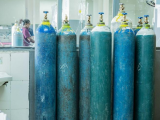Supplies of Pluvicto, a radioactive drug used to treat metastatic prostate cancer, should rise "meaningfully" in the second half of this year, according to its lone manufacturer.
In April, Novartis AG announced that the US Food and Drug Administration (FDA) had approved manufacture of the drug (generic name, lutetium Lu 177 vipivotide tetraxetan injection) at a new facility in Millburn, New Jersey, in addition to its Ivrea, Italy, plant.
"Production will begin in the coming weeks and ramp up gradually," the announcement said. "The site is expected to contribute meaningfully to supply and sales in the third quarter, after the anticipated approval of additional lines at the site. Capacity should continue to increase through the second half of this year, helping to ensure stable, reliable supply to patients."
Drug can't be stockpiled
In February, Novartis told NBC News that it had paused taking new orders after Pluvicto supplies dwindled amid increased demand. The drug is made in small batches that must be used within 5 days and thus can't be stockpiled. Pluvicto has been on the FDA's drug shortage list since March 7.
David Margraf, PharmD, PhD, pharmaceutical research scientist at the Resilient Drug Supply Project (RDSP), said that the shortage is primarily due to the difficulty of producing lutetium-177, a key component of the drug. RDSP is part of the University of Minnesota's Center for Infectious Disease Research and Policy, publisher of CIDRAP News.
"Lutetium metal is a rare, difficult-to-produce, and expensive element, which then requires complex and time-consuming synthesis in a nuclear reactor to produce the radioisotope, lutetium-177," he said.




















